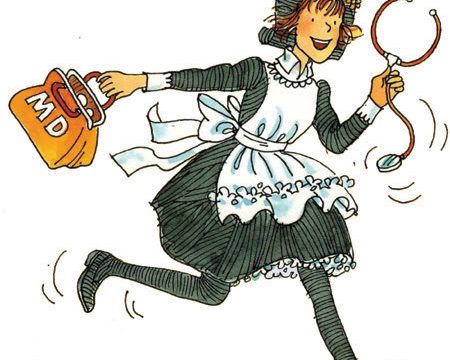I don’t remember how old I was. But probably seven or eight—of an age, in short, where most of my classmates were only really beginning to read to themselves on a regular basis instead of having books read to them. My local library divided the children’s books into several categories. Between picture books and Just Plain Fiction were the E books. E-1, E-2, and E-3. “E” stood for “easy,” and they were the books that were intended for beginning readers. And I sat down with great pleasure in one of the chairs by the big window overlooking the parking lot with an Amelia Bedelia book, ready for a little dumb wordplay. And Jacqui, the children’s librarian, told me that I was a better reader than that and should be reading something at my own level.
This is, in my opinion, about the worst thing you can do to someone. Jacqui couldn’t kill my love of reading. That would have taken Rasputin-level killing. But it seems to me that the cruelest way to kill someone’s enjoyment is to tell them that it’s beneath them. Yes, okay, at that age, I was also reading The Wizard of Oz to myself, and there were always the scads of Encyclopedia Brown books (which I’m now sharing with my own five-year-old), but if I wanted to read something light and silly, who was I harming? It wasn’t as though I never read anything more challenging.
I knew someone in college who said she’d never read A Wrinkle in Time and was waiting until she had children of her own and had an excuse. I pointed out that she could read whatever she wanted, and she said, no, children’s books were for children. It was bizarre to me. I can only imagine what she thought of my collection of children’s movies. I didn’t own as many then as I do now—I didn’t own as many movies then as I do now—but I would routinely buy them, even then. Books, too.
“Too smart” is another one I’ve heard, and it’s equally damaging—perhaps more damaging, because it implies that you’re better than whatever-it-is. By extension, are you not then better than the people it’s for? I’m not saying everyone feels that way, but I am saying it’s possible to and that it’s not great to imply. “Too old” or “too skilled” are what they are, but too smart is internal. The art is made for people who are less smart than you are, and you can look down on them for being the sort of person it’s made for.
At least with “too old” or “too skilled,” there’s the future chance of rediscovering the joy of it by sharing it with children. (Though I’m pretty sure that person I knew in college eventually decided not to have them; I don’t know if she ever got around to A Wrinkle in Time.) I still think the worst way to kill someone’s enjoyment of experiencing art is to tell them they’re enjoying the wrong art, especially if the person in question is a child. And why would you want to kill a child’s enjoyment of experiencing art?
I plan to enjoy the heck out of Disney+ when it comes out; help me afford to by supporting my Patreon or Ko-fi!

